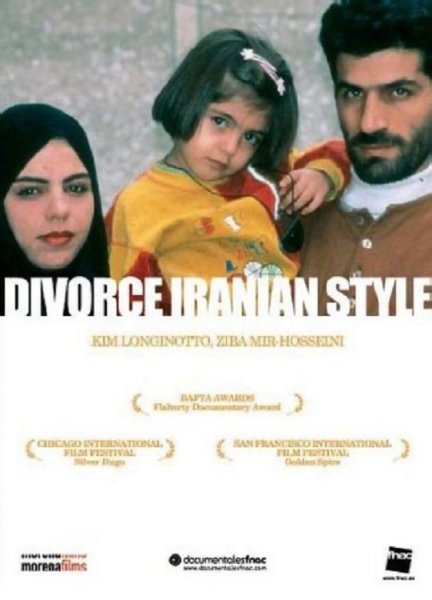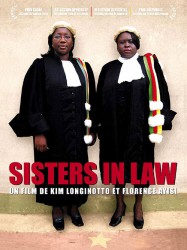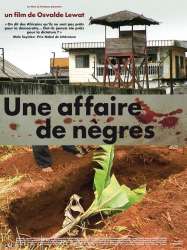Divorce Iranian Style is a film of genre Documentary directed by Kim Longinotto released in USA on 1 october 1999
Divorce Iranian Style (1998)

If you like this film, let us know!
- Infos
- Casting
- Technical infos
- Photos
- Videos
- Film quotes
- Characters
- Music
- Awards
Divorce Iranian Style is a 1998 documentary film directed by Kim Longinotto which chronicles the legal battles of three Iranian couples as they seek divorce in the Iranian court system. The film documents three couples as they go through the various legal processes and cultural barriers as they seek to file for divorce and highlights the poignant differences of men and women in the court system. The film also shows the complexity of blending religious law with a state run court system.
Comments
Leave comment :
Suggestions of similar film to Divorce Iranian Style
There are 5 films with the same director, 8867 with the same cinematographic genres, 2902 films with the same themes (including 498 films with the same 2 themes than Divorce Iranian Style), to have finally 70 suggestions of similar films.If you liked Divorce Iranian Style, you will probably like those similar films :

Sisters in Law (2005)
, 1h44Directed by Kim Longinotto
Genres Documentary, Crime
Themes Documentary films about law, Documentaire sur une personnalité
Rating72%





The film centres around four cases in Cameroon involving violence against women. It shows women seeking justice and effecting change on universal human interests issues. It also shows strong and positive images of women and children in Cameroon.

Rough Aunties (2008)
, 1h43Directed by Kim Longinotto
Genres Documentary
Themes Films about children, Documentary films about law, Documentaire sur une personnalité, Documentary films about child abuse, Films about child abuse
Rating69%






Amazonia for Sale (2010)
, 35minutesGenres Documentary
Themes Documentary films about law, Documentaire sur une personnalité, Documentary films about politics, Political films

Une Affaire de nègres (2009)
, 1h30Directed by Osvalde Lewat
Genres Documentary
Themes Films set in Africa, Documentary films about law, Documentary films about war, Documentary films about historical events, Documentaire sur une personnalité, Documentary films about politics, Political films
March 20, 2000, a decree by the President of the Republic of Cameroon set up an Operational Command Unit to tackle rampant banditry in the Douala region. The Unit introduced what amounted to round-ups: in one year, 1600 people disappeared or were killed. One year later, nine young men disappeared. The matter was submitted to the UN High Commissioner for Human Rights. The accused were found guilty of "failure to follow orders" and released but legal proceedings have not come to an end. The victims' families have to live between the desire for justice and the pressure for the crimes to be wiped out forever from the collective memory.

Loyalties (1999)
Genres Documentary
Themes Films about slavery, Films about racism, Documentary films about racism, Documentary films about law, Documentary films about historical events, Documentaire sur une personnalité

Origin Israel
Genres Documentary, Historical
Themes Films set in Africa, Films about religion, Documentary films about law, Documentary films about war, Documentary films about historical events, Documentaire sur une personnalité, Documentary films about politics, Documentary films about religion, Political films, Films about Jews and Judaism
Rating59%






Awka Liwen (2010)
Genres Documentary, Historical
Themes Documentary films about law, Documentaire sur une personnalité
Actors Osvaldo Bayer, Felipe Pigna
Rating78%






ChickenHawk (1994)
, 55minutesOrigin USA
Genres Documentary
Themes Films about children, Medical-themed films, Films about sexuality, LGBT-related films, Films about pedophilia, Documentary films about law, Documentaire sur l'homosexualité, Documentaire sur une personnalité, Documentary films about health care, Documentary films about child abuse, Films about psychiatry, Films about disabilities, Films about child abuse, LGBT-related films, LGBT-related film
Rating67%





The film describes the organization and its history. It presents a series of interviews with NAMBLA members who describe their feelings towards boys and justifications for such feelings.
 , 3h34
, 3h34Directed by Ken Burns
Origin USA
Genres Documentary
Themes Films about racism, Sports films, Martial arts films, Boxing films, Documentary films about sports, Documentary films about racism, Documentary films about law, Documentary films about historical events, Documentaire sur une personnalité, Le boxe anglaise
Actors Keith David, Samuel L. Jackson, Adam Arkin, Philip Bosco, Kevin Conway, Brian Cox
Rating82%






The Self-Destruction of Gia (2003)
, 1h20Origin USA
Genres Documentary
Themes Medical-themed films, Films about drugs, Documentary films about law, Documentaire sur une personnalité, Documentary films about health care, Films about psychiatry, Films about disabilities, HIV/AIDS in film
Actors Zoë Lund
Rating81%





 Connection
Connection